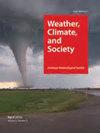关于极端高温的交流:来自不同领域专家的卡片分类和思考访谈的结果
IF 1.9
4区 地球科学
Q3 ENVIRONMENTAL STUDIES
引用次数: 0
摘要
气候趋势表明,随着时间的推移,极端高温事件变得越来越普遍和严重,需要改进沟通高温风险和保护行动的策略。然而,在与热相关的沟通中,专家与决策者和公众之间存在脱节,专家通常包括与热相关术语(即技术语言)。事实证明,使用行话会减少对专家所写信息的有意义的参与和理解。将技术语言转化为可理解的信息,鼓励决策者采取行动,已被确定为实现基于影响的决策支持的优先事项。了解哪些概念和术语被认为是行话,以及为什么,是提高沟通效率的第一步。考虑到这一点,我们将重点关注两组领域专家关于极端高温的心理模型——接受过大气科学培训的专家和接受过应急管理培训的专家,以确定每组专家如何理解极端高温的术语和概念。我们使用开放式卡片排序和大声思考访谈的混合数据收集方法来确定参与者如何对与酷热相关的术语和概念进行概念化和分类。虽然我们在分类中发现了一些差异,但我们了解到,导致决定是否包括技术信息的重要性的过程因组而异。研究结果提出了关于极端高温的建议和优先事项。本文章由计算机程序翻译,如有差异,请以英文原文为准。
Communicating about Extreme Heat: Results from Card Sorting and Think Aloud Interviews with Experts from Differing Domains
Climate trends indicate that extreme heat events are becoming more common and more severe over time, requiring improved strategies to communicate heat risk and protective actions. However, there exists a disconnect in heat-related communication from experts, who commonly include heat related jargon (i.e., technical language), to decision makers and the general public. The use of jargon has been shown to reduce meaningful engagement with and understanding of messages written by experts. Translating technical language into comprehensible messages that encourage decision makers to take action has been identified as a priority to enable impact-based decision support. Knowing what concepts and terms are perceived as jargon, and why, is a first step to increasing communication effectiveness. With this in mind, we focus on the mental models about extreme heat among two groups of domain experts –those trained in atmospheric science and those trained in emergency management to identify how each group understands terms and concepts about extreme heat. We use a hybrid data collection method of open card sorting and think-aloud interviews to identify how participants conceptualize and categorize terms and concepts related to extreme heat. While we find few differences within the sorted categories, we learn that the processes leading to decisions about the importance of including, or not including, technical information differs by group. The results lead to recommendations and priorities for communicating about extreme heat.
求助全文
通过发布文献求助,成功后即可免费获取论文全文。
去求助
来源期刊

Weather Climate and Society
METEOROLOGY & ATMOSPHERIC SCIENCES-
CiteScore
3.40
自引率
13.60%
发文量
95
审稿时长
>12 weeks
期刊介绍:
Weather, Climate, and Society (WCAS) publishes research that encompasses economics, policy analysis, political science, history, and institutional, social, and behavioral scholarship relating to weather and climate, including climate change. Contributions must include original social science research, evidence-based analysis, and relevance to the interactions of weather and climate with society.
 求助内容:
求助内容: 应助结果提醒方式:
应助结果提醒方式:


